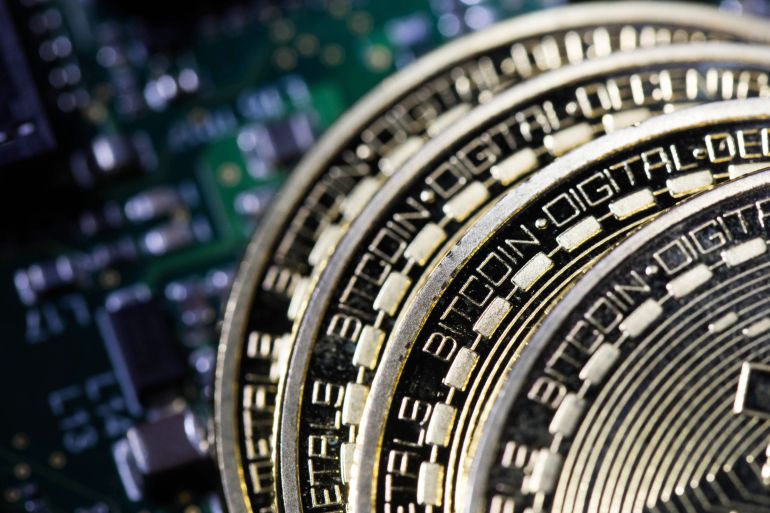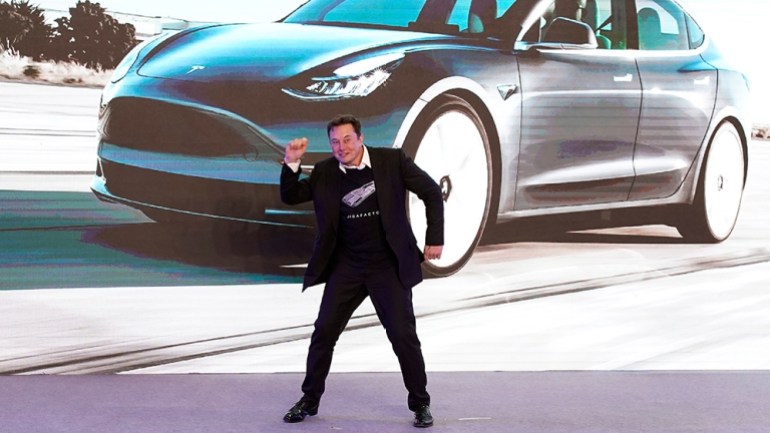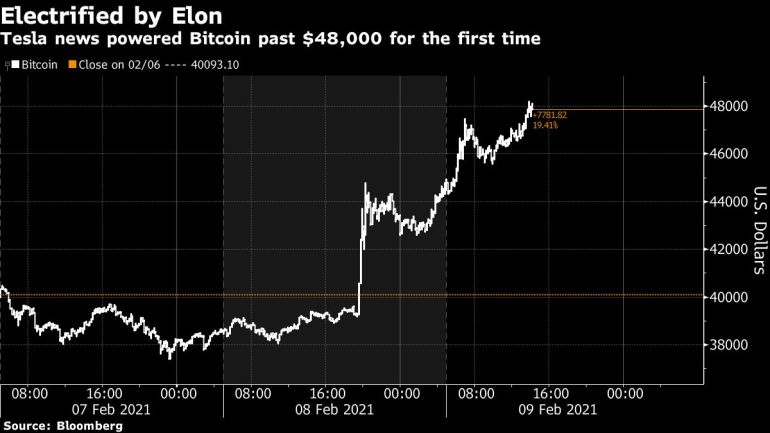Bitcoin nears $50,000 as cryptocurrencies ride Tesla wave
Bitcoin is at the head of the pack in a cryptocurrency boom, gaining 1,150 percent since its March 2020 low.

Bitcoin powered to a record high on Tuesday, approaching the $50,000 mark, basking in the afterglow of Elon Musk-led Tesla’s investment in the cryptocurrency that had investors believing it may become a mainstream asset class.
The most popular cryptocurrency has gained 1,150 percent since its March 2020 lows, as institutional investors searched for alternative investments and retail traders rode the wave. It traded at a few hundred dollars only five years earlier. Glassnode, which provides insight on blockchain data, said in its latest report that bitcoin’s limited supply suggested further gains for the virtual asset.
Keep reading
list of 4 itemsBitcoin soars 15% after Tesla says will accept it as payment
Bitcoin briefly exceeds $47,000 record, stocks and oil also rise
Global chip shortage chokes China’s bitcoin mining sector
Bitcoin’s liquid supply is continuing to decrease, as investors increasingly acquire and “hodl” the asset for the long term. “Hodl” is crypto slang for the act of an investor holding the asset instead of selling it.
Currently, around 78 percent of issued bitcoin are either lost or being “hodled”. This leaves less than four million bitcoins to be shared among future market entrants — including large institutional investors such as PayPal, Square, S&P 500 companies, and exchange-traded funds, Glassnode said.
On Monday, bitcoin leapt 20 percent after Tesla announced it had a $1.5bn investment and that it would eventually take the cryptocurrency as payment for its cars. That was its largest daily rise in more than three years.
Bitcoin climbed to a peak of $48,216.09 — almost enough to buy one of the best-selling Tesla vehicles, the Tesla Model Y SUV. Rival cryptocurrency Ethereum struck a record high of $1,825.36 on Tuesday.

Musk’s foreseeing acceptance of the currency as payment for Tesla cars has analysts reckoning this is a large shift as companies and big investment houses follow small traders into the asset.
Marc Chandler, chief market strategist at Bannockburn Global Forex, remains unconvinced and said bitcoin remains a speculative vehicle.
“The fact that it draws some institutional investors or even some companies does not change this fact: bitcoin has no earnings stream that can be modelled,” said Chandler. “It has no break-up or replacement cost. There is no intrinsic value. They have no use-value the way economists understand it.”
Bitcoin’s volatility has also been a hindrance for some serious investors and a sticking point in using it for transactions. Realised volatility, or daily price swings measured in terms of closing prices for bitcoin over the past 90 days, was at 72 percent, compared with 16 percent for the S&P 500 stocks index and 6 percent for the euro currency.
What’s more, with bitcoin’s value tripling in the past three months, analysts raised questions over how its volatility would affect someone buying a Tesla car in bitcoin.
“Unless the price of bitcoin stabilises, either bitcoin’s price falls drastically and you end up having won a Tesla in a lottery, or its price triples and you end up paying your Tesla far too expensive,” said Ipek Ozkardeskaya, senior analyst at Swissquote Bank.
‘Earliest phases’
Billionaire Musk has long been a cryptocurrency fan — and has talked cryptocurrency up online — but Tesla’s hard currency investment came as a surprise that has put a rocket under the sector.
“Right now, it still seems like a bit of a leisurely pursuit, to acquire bitcoin. But I think by the end of the year, with the current rate of institutional flow inbound, it will become clear that this is a once-in-a-lifetime land grab,” said Jehan Chu, founder and managing partner at Kenetic, which invests in blockchain-related companies.
Still, in Bank of America’s January fund manager survey, bitcoin topped the list of “most crowded” trades. Another survey, by Deutsche Bank, warned of price bubbles in the cryptocurrency.
Bitcoin is already up 67 percent this year, on top of a 300-percent rally last year, as investors search for alternatives to the dollar because of the United States Federal Reserve’s zero-percent interest rates. The dollar slid against most currencies on Tuesday.
In the ongoing digital wave, central bankers and regulators, particularly in China, are also starting to embrace issuing their own digital currencies for everyday use, in a major break from the conventional workings of global finance.

Beijing will issue 10 million yuan ($1.55m) worth of digital currency to residents that can be used during the Lunar New Year holiday starting on Thursday, domestic media reported.
However, Vitor Constancio, former vice-president of the European Central Bank, wrote on Twitter that policymakers should focus on regulating cryptocurrencies and develop digital currencies only if they will help banks in their role of enabling credit creation.
The Tesla news-led rally stretched beyond bitcoin. Shares of companies that provide trading platforms for bitcoin and the technology to “mine” the cryptocurrency surged in China, South Korea and Australia – and stocks of big computer-chip-making companies such as SK Hynix also rose.
MicroStrategy Inc, a business intelligence software firm and bitcoin buyer, has climbed 215 percent so far this year, after posting gains of 172 percent in 2020.
Even Dogecoin, a cryptocurrency with a dog as its symbol, has seen its value turbocharged after Musk mentioned it on Twitter. It has jumped 13 percent in the past day, according to CoinMarketCap.
“It’s really become popular culture and mainstream,” Chu said. “People are no longer asking ‘Why should I invest in bitcoin?’ They’re having to defend why they’re not.”